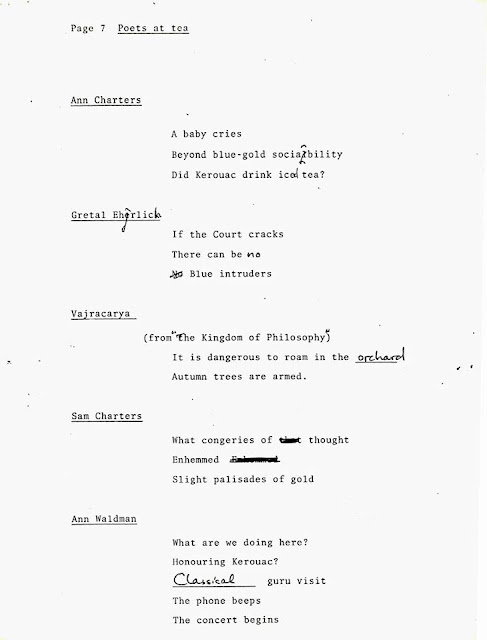AG: I read this about a year ago and understood it for the first time and really dug it."The Bishop, Lawless"? - without law?, without any learning?.. You got it? - Page six.
Bishop lawless,/ King guideless,/ Young man reckless,/Old man witless,/A woman shameless - I swear by heaven's king,/These be five bitter things."
evil things - bitter/evil - it'll be five evil things - "I swear by heaven's king,/ These be five evil things."
It's a pretty interesting set-up as like now. The bishops, without learning; kings, without any common sense counsel,"young man reckless, old man witless" (old man witless, it's just a funny idea - "young man reckless , old man witless" - I say that's a great rhyme - "young man reckless , old man witless" - Perfect - The reason I like these is .. ,"young man reckless , old man witless" buck starts..who is it? ""Bullock starts, buck farts" ("Bulluc sterteth/bucke verteth") The rhythms, if they get in your bones actually, will issue forth from your hand when you're writing, will affect your rhythms in writing, or will sensitize your ear, or sensitize your musical bones. So it's interesting if you take these like pills, like, "drop these poems like acid", or something like that, and let them enter your nervous system. It's actually exposure of your nervous system to these particular rhythms that sensitizes you to.. sensitizes one (you, me) to rhythm, and these are sort of real basic, classic, fantastic.."old man witless, young man reckless", that's pretty.. you know, that's perfect..fast.
"All night by the rose, rose /All night by the rose I lay/ Dared I not the rose steal/And yet I bore the flower away" -
That's kind of mysterious. I like the rhythm - "All night by the rose, rose" - "All night by the rose, rose" - that's a good one - "All night by the rose I lay/ Dared I not the rose steal.." - "All night by the rose, rose", /"Dared I not the rose steal" - bomp-bomp,/ bomp-bomp - (rose-rose,/ rose-steal) - So that the two solid words at the end of those two lines (will) parallel each other, first and third line. If you tune your ear in to that, it's not just like a sing-song rhyme rhythm, it's a very interesting song power you can get - "rose, steal, rose, rose." - You know what I'm talking about? Everybody noticing that? how pretty that is, yes? - I guess, probably affected by Latin prosody, which counted the duration of syllables, the duration of vowels, rather than the accent on syllables (old Latin and Greek prosody was a count of long vowels and short vowels, not so much preoccupied with accent). And, it sounds like the guy who wrote that in English was… had his ear affected by hearing "rose, rose, rose, steal" - "All night by the rose, rose/all night by the rose I lay/Dared I not the rose steal/And yet I bore the flower away."
It's probably good as song (for those who are interested in song), you know (Allen breaks into a sung version)- "All night by the rose, rose /All night by the rose I lay/ Dared I not the rose steal/And yet I bore the flower away" ) - "Da,da, dum, da-da, da, da-da-da, da, da-da, da, Da,da, dum, da-da, da, da-da-da, da-da-da" - So it's out of music, and out of Latin.. probably out of Latin-Greek quantitative prosody. It's hearing the length of vowels, sensitivity to the length of vowels, and probably the music
What we got next? - Yeah, there's a poem by H Phelps Putnam of the twentieth century that takes off from this, "All night by the rose", I'll bring it in next time…..
"In Springfield Massachsetts..", (under the single bulb that hung from the hotel ceiling, I lay all night and) "devoured/ The mystic, the improbable, the Rose.." - "In Springfield Massachusetts.." - H. Phelps Putnam, 1927. - I'll bring in the poem, it's real beautiful, but it's a take-off on that.
[from "Hasbrouck and the Rose"]
"In Springfield, Massachusetts, I devoured
The mystic, the improbable, the Rose,
For two nights and a day, rose and rosette,
And petal after petal and the heart,
I had my banquet by the beams
Of four electric stars which shone
Weakly into my room, for there,
Drowning their light and gleaming at my side.
Was the incarnate star
Whose body bore the stigma of the Rose.
And that is all I know about the flower;
I have eaten it - it has disappeared.
There is no Rose."
[Audio for the above can be heard here, starting at approximately fourteen-and-three-quarter minutes and concluding at approximately twenty-one-and-a-half minutes in]




























































